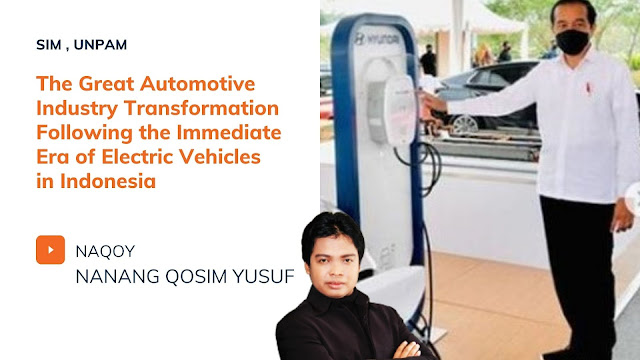In 2030, more than 14 countries and 20 cities will prohibit the sale of fossil (diesel)
vehicles. England begins as a figure of support for the Green Revolution in 2030, with the goal of
reducing emissions by 2050. While Canada, Japan, and China respond in 2035, Germany goes even
further, prohibiting the use and sale in 2035. The United States, China, Dubai, and India are all
competing to announce that diesel cars will be banned beginning in 2035. As in this case, it will be
fascinating to see how conflict resolution works between fossil car manufacturers (diesel) and electric
car manufacturers such as Tesla. Even Toyota's founder, Akio Toyoda, who has yet to find a
replacement, openly opposes government policies, Electric vehicles (EV), in his opinion, will harm the
environment. a lot bigger than before President Jokowi's attitude and decision towards KBL (ElectricityBased Vehicles) in Indonesia is very clear and focuses on the fact that diesel-based vehicles must
gradually be abandoned and replaced with electricity, given the impact of pollution, which is already
difficult to control. President Jokowi's directive was delivered in 2020 in the grand ballroom of The Ritz
Carlton Pacific Place (PP) Jakarta, as reported by CNN under the headline "Jokowi's Directions, the
New Exclusive Capital for Autonomous Electric Vehicles." It will be interesting to see how the
government and the automotive industry prepare to respond to the president's new policy to become a
strong questioning force that will be the focus of this paper. From the assessment carried out, the
country is of great to become one of EV leaders in the World due to skill labors advantages as well as
abundant natural resources to support EV manufacturing in Indonesia.
INTRODUCTION
President Jokowi reiterated in front of the directors of SOEs and participants of the
PPSA XXIII National Resilience Institute at the State Palace on Wednesday (13/10/2021) that
Indonesia is capable and independent of producing a national electric car within the next three
or four years. As stated in his speech, "Integrating Krakatau Steel, lithium batteries, and nickelderived industries with the automotive industry" Krakatau Steel can now produce thin sheets
for car bodies thanks to changes in the construction of a hot strip mill factory .Referring to
Krakatau Steel's capacity, which has a steel industry of 1.5 million tons per year with a value
of IDR. 7.5 trillion, we can see that it is capable of producing premium quality products. It's
worth noting that there are only two capable factories, located in America and Indonesia.
President Jokowi's decision to halt the export of nickel materials to other countries so that they
can be consumed domestically is considered audacious and has far-reaching consequences.
The European Union even filed a lawsuit against Indonesia to stop the importation
of nickel ore, claiming that it violated Article XI paragraph 1 of the 1994 General Agreement
on Tariffs and Trade. What President Jokowi is attempting is analogous to the One Minute
Awareness formula, which is a starting point for becoming a great nation. According to the
book One Minute Awareness, developed countries initially encountered problems, but their
way of thinking (mindset) transformed them into opportunities, giving birth to dreams and real
solutions for life with modern and best technological solutions, such as Singapore, which has
an area of only 721.5 kilometers squared and a population of 5.61 million people. This
limitation was used as a stepping stone toward becoming an Asian developed country. Dubai,
which was originally only the world's largest desert, has succeeded in becoming the world's
best tourism city. This is what Indonesia considers necessary, given that the country's growing
pollution problem necessitates the government making a breakthrough in the world of
transportation. Collaboration between technology and transportation results in the
development of KBL (Electricity-based Vehicles) as a viable solution to the aforementioned
issues (Naqoy: OMA: 2019).
In One Minute Awareness, Naqoy explains that enterprises or countries that will be
above average (advanced and leading) have a formula that looks like this: PX D X B X C,
which stands for Pressure X Dream X Believe X Consistent. America, China, India, Dubai,
Japan, and even Korea are countries that are becoming stronger as a result of the present
pressure; they have successfully used pressure as a new means to become a leader. Even
the CEOs of the world's greatest firms, such as Microsoft, Dell, and Google, are of Indian
heritage. America, as a technological leader that is now being overtaken by China, is similar
to India, which has more advanced information technology skills than its bordering countries.
After the bombings of Nagasaki and Hiroshima, Japan was able to resuscitate itself by
economic warfare, exporting cars manufactured by Japanese companies such as Toyota,
Honda, Mitsubishi, and others. Dubai is comparable in that it is the best city in the world while
also creating world-class tourist attractions in a sweltering desert. This demonstrates that
anyone who wants to progress must be prepared to deal with a variety of challenges.
Indonesia is bold to stop exporting nickel and similar elements to Europe because it will be
used solely as energy in the future, despite the European Union's insistence. When pressure
is used as a motivator for huge aspirations, as it is in this case, electric automobiles are the
future road of success for Indonesia in the eyes of the world, despite the pressures and
problems they face on the inside and outside. The Dream big formula is the second formula.
Indonesia's ability to become a player in its own country becomes obvious and reasonable.
The President demonstrated his willingness to dream of having an electric automobile by
promulgating presidential order No. 55/2019 about the Acceleration of the Battery-Based
Electric Vehicle Program (Battery Elictiic Vehicle) on August 12, 2019 .
The Government's vision for Indonesia is being realized swiftly, but in order to see
electric cars come in Indonesia over the next three years, it appears that the government has
engaged into a collaboration and MOU with Hyundai Motor Group and LG Energy Solution
(28/07/21). Hyundai and LG Energy Solution spent USD 1.1 billion, or 14.8 trillion, on a 33-
hectare facility capable of producing MCNA lithium-ion battery cells with a total capacity of 10
GWh per year. battery (BEV) per year. Since the threat of pollution in Indonesia is growing till to date, this decision is critical and may possibly be considered an emergency. According to
data from the Central Statistics Agency (BPS) issued in 2018, motorcyclists in Indonesia have
reached 16.4 million units, with 16.4 million passenger cars dominating the market. It is even
predicted that this trend will continue year after year, generating major pollution. It is
impossible to halt it. Furthermore, according to Air Visual (airvisual.com), Jakarta, Indonesia's
capital city, is the second most polluted city in August 2019. A constant increase in CO2
content in the atmosphere to 400.26 ppm was reported in 2015, making it an emergency not
only for the world, but also for our own country. The realm of transportation makes the greatest
contribution to fossil fuel consumption.
The dream of owning an electric car in our own country can be realized if we follow the
"One Minute Awareness" theory, which is self-confidence. Indonesia is considered capable of
owning its own car because it has 30% natural resources (nickel) on a global scale, and the President's policy is a confident step towards advanced Indonesia in the next 5 years.
Furthermore, these Natural Resources are backed up by the harmony and fighting power of
superior Human Resources (above average). Collaboration between SDA and HR will help to
achieve huge targets in the short term. This is where a state of awareness is required,
beginning with the awareness of thinking that we are competent, the awareness of the heart
for one Indonesia, and the awareness of the soul that owning an electric automobile is a sign
of thanks. Although there is still a process and time that will test it, awareness of awakening
and making Indonesia above average is Indonesia's future attraction in the eyes of the world.
Technological leadership that is maintained with a clean heart will make us all feel proud in
the future for this great achievement. This country's seriousness has its own electric vehicle.
The last formula (K), Consistency, is the most critical factor that becomes a weak point.
The true and reasonable solution is for Indonesia to become a player in the automotive era,
as indicated by President Jokowi, through the "Green economy and blue economy," as well
as full awareness of all commodities, which will lead to down streaming. Preparing electric
cars by integrating the use of natural resources with environmentally friendly technology and
sound economic principles is something that must be done now and in the future.
LITERATURE REVIEW AND HYPOTHESIS DEVELOPMENT
History of electric cars
People are still waiting for the results of electric cars in their own country, despite the
results of various surveys showing that 47 percent of Indonesians are interested in them. An
electric car is a car (vehicle) that uses an electric motor as its propulsion and a battery as a
storage of electricity. The problem that often arises is the concern of the battery as the
electricity saving power, is it strong enough and long enough to store the electric power or vice
versa, so people are still waiting for the results of electric. In fact, when it comes to electric
cars, it all began in the 1980s, with a patent for electric bicycles being granted at the end of
1860. Anyos Jedlik, a Hungarian, was a pioneer of electric cars in the early period, creating
an early prototype of an electric engine in 1928. Although taxis in New York didn't start using
electricity until 1897, thanks to the Electric Carriage and the Philadelphia Wagon Company.
Big firms like Anthony Electric, Stude-Bacer, Riker, Coumbia, and Milburn competed
to develop electric cars in the early twentieth century. While Woods Motor Vehicle Co successfully manufactured the Phaeton in 1902, this electric automobile has a top speed of
14 miles per hour and a range of 18 miles. When comparing electric cars to fossil cars, it was
discovered that the first known electric cars were electric cars. However, after the 1970s,
electric cars began to fade as they became less popular than cars with internal combustion
engines, especially because the mileage achieved by ICE (internal combustion engine) cars
is much greater, allowing them to be mass-produced, making diesel cars much cheaper. The
world is, indeed, a paradox, with ups and downs. There was an energy crisis in 1980, which
caused car companies to abandon large car production with wasteful fuel. Small and ecofriendly cars were marketed by world car manufacturers such as Tesla and Mistubishi in the
early 2000s. Mitsubishi Motors from Japan sold electric cars (i-MiEV) in Hong Kong in May
2010 and in Australia in July. Electric cars are an option that provides two benefits: high
comfort and environmental friendliness, especially as the world community moves toward
Sociaty 5.0.
New world to welcoming electric car in 2035-2050
Currently, electric cars are becoming a common awareness to save the earth
(common place), to the point where Europe officially prohibits the production of diesel-powered
cars in 2030, citing the green revolution in 2050. California is at the forefront of commitments
to phase out diesel engines, and by 2035, all passenger cars must be zero-emission. What
California is doing is part of a larger global trend. The image below (Figure 4) shows that
European countries are leading, including Norway and the Netherlands, which are the most
stringent in this regulation.
It could be even faster in the next five years. Norway will prohibit the sale of diesel
cars, and the Netherlands will follow Norway's strict rules regarding diesel cars, requiring that
cars operating in their country by 2025 be completely emission-free. The Netherlands' goal is to become a Non-Emission City by 2025-2030. Following the Netherlands and Norway in
Europe are Iceland, Denmark, Ireland, Slovenia, and Sweden. While the UK will aim for 2035,
even though the start date is 2040, there is a chance that the UK will be ahead of schedule.
Furthermore, France began to prohibit the use of fossil fuel vehicles around 2040, while Spain
began to draft legislation prohibiting the use of fossil fuel vehicles in 2040. Interestingly, the
Canadian province of British Columbia has asked car companies to gradually adapt in the sale
of electric vehicles beginning in July 2020. Sales will gradually increase to 10% by 2025, 30%
by 2030, and 100% by 2040. There is also enthusiasm in Central and South America,
specifically in Costa Rica and Colombia, to ensure that all are zero-emissions by 2050. Clearly,
no less ambitious is China's Hainan province, which has determined that by 2030, all types of
zero-emission vehicles with the following specifications will be available. An increase of 10%
to 40% in 2019, an increase of 80% to 100% by 2025, and a total of 100% by the end of 2030.
While the state of Cape Verde, located off the coast of northwest Africa, is the only African
country that has committed to prohibiting the import of diesel-powered vehicles by 2030. As
many as 18 countries, as shown the Table below, agreed in the International Zero Emission
Vehicle Alliance (IZEVA) that all passenger vehicle sales will be zero-emissions by 2050. The
countries listed below have made a joint commitment to electric vehicles by 2050.
Indonesia welcoming electric cars
According to a recent study, Indonesia and Southeast Asian countries have maintained
their enthusiasm for the development of electric vehicles, owing to the need for a better and
more sustainable future. According to the journal "The Future of Electrified Vehicles in
Southeast Asia," a consumer survey conducted in Thailand, the Philippines, Indonesia,
Malaysia, Vietnam, and Singapore revealed that nearly two-thirds (64 percent) of those polled
intend to purchase an electric vehicle in the near future. close. In Indonesia, half of non-electric
vehicle owners (diesel cars) said they would definitely consider owning an electric vehicle as
a future car (Frost & Sullivian). Forty four (44) percents of respondents said electric cars were
"cool," and 58 percent said the cost of maintaining electric cars was less expensive than
before. In the future, the world industry will require battery materials that will be used for needs,
there will be a 4X increase in EV batteries in 2030, this is an opportunity (opportunity) for
Indonesia, some even say that Indonesia can become the king of nickel in the future, the need for oil will decrease, and this will have an impact on the pattern of business strategies on the
global stage.
Meanwhile, Indonesia's strength is its existing natural resources, as well as its
willingness to collaborate with international investors to build battery factories. According to
data from the Ministry of Energy and Mineral Resources, the price of nickel reference mineral
in February 2021 reached US$ 17,434 perdmt, a 24 percent increase over the price in
February 2020, which was US$ 14,030 perdmt. Indonesia is said to hold 30% of the world's
nickel reserves of 21 billion tons, as well as important battery components such as aluminum,
copper, and manganese. Nickel resources totaling 21 billion tons, aluminum resources totaling
1.2 billion tons, copper resources totaling 51 billion tons, and manganese resources totaling
49 billion tons. Indonesia, with its abundant human resources, has the potential to take the
lead in the global energy industry. Now that the world is waiting to see whether Indonesia can
play the best role in the future as a leader or as a user, the Jokowi government recognizes
that this is the best opportunity to make an aggressive move in order to become a player in its
own country. Indonesia is ranked first among the world's ten largest producers, followed by
the Philippines, Russia, New Caledonia, Australia, Canada, China, Brazil, Cuba, and the
United States .














.jpeg)
.jpg)







